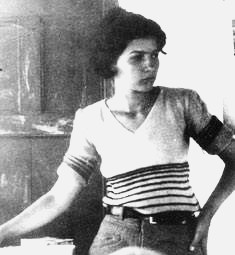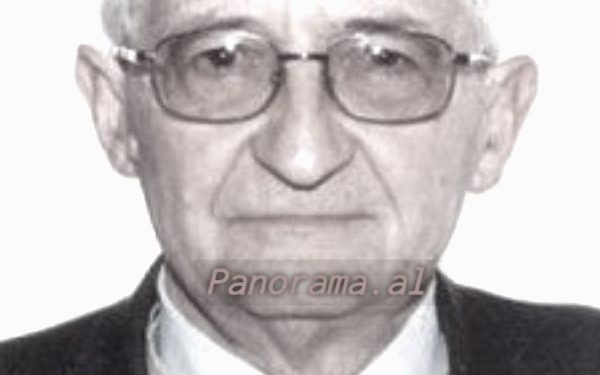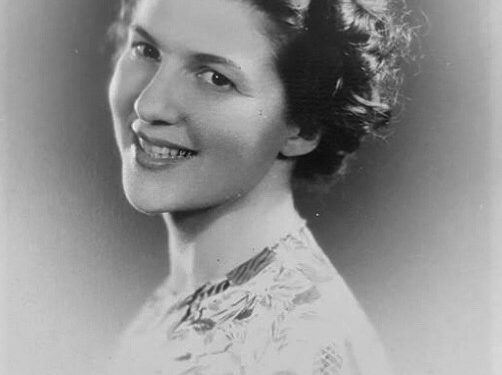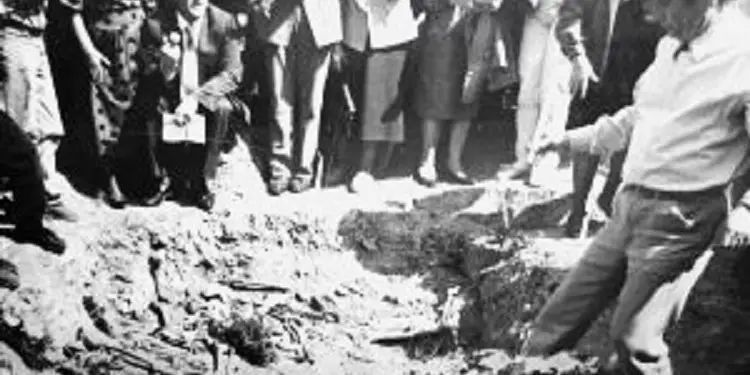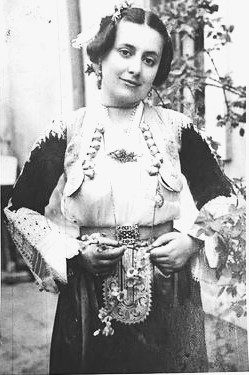Memorie.al / Dictator Enver Hoxha shot Sabiha Kasimati for personal revenge. The nephew, Viktor Kasimati, tells about the real reasons for the shooting of his aunt, Sabiha Kasimati. The only woman among 21 men, who were buried in the village of Mënik near Ura e Beshiri, not to leave behind any traces, except for reasons that the years would explain in silence. As he returns to the memories of many years ago, he remembers that his aunt, a classmate of Enver Hoxha, considered him as “Don Juan” and had openly accused him of killing intellectuals.
Exactly 73 years ago, in the village of Mënik, near the Beshir Bridge, there were three days and nights of work to open a large pit. The villagers of the area did not understand anything, what was this sudden arrival of the “state” near their homes. Those three days had to pass and the last night arrived, for the cry of a woman to be heard, which would arouse the curiosity of all the surrounding residents. It was Sabiha Kasimati, the intellectual who was shot along with 21 other men accused of bombing the Soviet Embassy in February 1951.
The families of the victims can learn how the events unfolded only after 1992. It was then that they had the opportunity to communicate with villagers in the area. It was then that they also learned about the struggles of the only woman in that group of men. The first bullet did not hit Sabihan and her death was delayed, unlike her friends. But this second time, there would be no more bullets. Consecutive suffering and torture, he would go through, until he gave up. Today, her nephew, her brother’s son, Viktor Kasimati, tells her all this.
When his aunt was shot, Victor was 16 years old, so he was able to remember those times in his house and how the situation was when they came and announced…! But what were the real reasons for this macabre punishment? Was anyone convinced that the “chess” that had broken only a few windows of the Soviet Embassy in Tirana, without causing even a single injury, was the real reason?! No! This event had only been the justification that, according to Viktor Kasimat, served Enver Hoxha to execute the people who were increasingly opposing his communist regime…!
Mr. Viktor, Sabiha Kasimati was your aunt, and one of the 22 people who were shot in 1951, after the bomb in the Soviet Embassy in Tirana. Do you remember anything from that time?
I was 16 years old when Sabihaja was shot. She was an educated girl, always engaged in the activities of the time. This made him energetic, but he also had a very blunt nature, from what I remember. From a situation with mine, when we talked about something, I remember that I was somewhat against it. My aunt was there and immediately saw me with frowning eyes, saying: “How do you talk back to mom”?! I remember that certain shyness always arose from her, precisely because of this heavy, almost manly nature.
She lived with you, since she was not married?
No, he never really married, but lived alone. Because of the ins and outs she had with researchers and other intellectuals in the country who always visited her, she needed her own space.
Where was he educated that he was involved in such a circle?
Sabihaja was born in Edrene, Turkey, and when she returned, she settled with her brother in Korça and in 27-, she started her studies at the French Lyceum of this city, being the only girl until that time. Even after High School, unlike her friends, she was determined to continue her higher studies, which at that time were only conducted abroad. Thus, she managed to realize her dream and completed her higher studies at the Faculty of Natural Sciences (Biology Department) in Turin.
When she started to be more engaged, she left to live alone, didn’t she, because she also lived with you…?
In the first years after the war, when I was still a child, I heard from family members that my aunt had been offered a job in America by her friends, with whom she had studied in Turin. I listened to her when she talked to her father and told him that she had refused, because she wanted to stay in her country, so she returned to Albania and was appointed to the Institute of Sciences, which was the highest scientific institution of those years, with director Selaudin Toton and where he collaborated with some of the most famous names in science of those years, such as Suad Asllani, professor Zuber, (a Pole who lived and worked in Albania, etc.). At this time, she left the apartment where she lived with us and moved to a separate apartment, to be freer to work.
From being part of intellectual elite, Sabihaja was quickly targeted by the leaders…?
At first, after the war, things seemed to be going well, but at the beginning of 1947-48, the class struggle in the country began to intensify. This was an attitude that Sabihaja never agreed with. Things became more difficult when the elite of intellectuals, some of whom were her friends, began to be punished and beaten. Especially the shooting of Selaudin Toto, created a great disappointment in her and made her create a belief completely against the communist regime.
He often came and talked with his father, saying that all that was being done was unjust and that the state could not be built on murder and violence. “I never believed in the communist doctrine, she said, but now I am convinced that I was not wrong.” He had incredible courage and spoke his mind openly. Moreover, she was closely acquainted with Enver Hoxha.
How was her acquaintance with Enver Hoxha?
Sabihaja was the first woman to study at the Korça High School, where she also met Enver, she was in her class. Consequently, he knew his intellectual capacity and many of the vices of his early youth. This has always made me believe that Enver Hoxha personally had an additional reason to seek her elimination.
This alone cannot be the reason…?! What other events were hidden behind this elimination, which you are convinced were by order of Enver Hoxha?
Sabihaja was rebellious by nature. I have also heard my father tell him often, to be careful when he spoke, because he was never familiar with them. But she was so prepared, it was impossible to stay silent, and she even openly blamed her former classmate for the crimes that were being committed in the country. Thus, the dictator could find a reason for her elimination, and why not involve her in terrorist activity, as he did.
Filling files at that time, it turns out that it was not that difficult, and especially to blacken them, it was very simple. The fact that she accompanied an English Labor journalist who had come to visit our country may well have been noted in her file, given that Sabihaja knew several Western languages. But later, no one prevented our Intelligence bodies, (State Security), from interpreting this fact as “agent activity”.
Did you have the chance to hear her in her rebellion against Enver Hoxha?
In my presence, my aunt was reserved in conversations about him, however I had heard her say to my father that; “The leader was not what he appeared to be.” “He was not so much the type of warrior, as the type of Don Juan, who did not stand out for any moral values”. He had known the country’s leader during his younger years, when it was even easier to make mistakes and, apparently, Enver’s youth had things to hide. He had shown immoral behavior during his high school years, so he had made a bad image in the city as well. It was this other part of the medal, which the aunt talked about often, until then she started speaking openly, accusing him of being the main responsible for the punishments that began to be done.
So, did Enver Hoxha punish her because of her opposing attitudes, or because something was hidden in the past that could come to the surface?
I think the two are intertwined, but of course her constant stances against the regime and against him personally were decisive.
Do you know any concrete situations of these reactions against?
Because of the random meetings on the street between the aunt and Enver, they talked and talked often and in no case the aunt was spared to say her word, as she thought. So much so that he once told him: “You only read the French imperialists, read Marx”. All these accumulations that he had made in all these years, made Enver reach the accusation that Sabihaja had organized this group of intellectuals and, together with the imperialists, would lead to the Third World War.
Imagine how far they have come…! But he didn’t take revenge only on her; there were 22 people who were shot! He couldn’t kill her alone, without a public accusation. Therefore, the variant of the bomb was found in the Soviet Embassy in Tirana. This was the best case to eliminate them, because the others, despite the fact that they were all intellectuals, reacted the same way as Sabihaja, so they were all punished, just because they refused to submit to the regime.
How and who notified you when he was shot?
The night after the explosion that occurred at the Soviet Embassy, where several windows were broken, a friend had been invited to her apartment. Exactly that midnight, Sabiha had been arrested. The next morning, her friend knocked on our house. My father came out, followed by me. “Last night I was at Sabihaja and he was arrested,” she said. No one then found out the reasons for the arrest. He had been handcuffed and taken to the Interior Branch, without any explanation. We in the family thought at first that this was all a mix-up that could be cleared up, but it was not.
That same day, another 300 people were arrested for verification, and we thought that my aunt might have been in this group. But the more time passed, the more we began to believe that something had happened. My grandmother, after all the time we tried to find out any news, went to meet Omer Nishan, whom she knew personally. Omer’s answer was clear: “I have nothing to do. She spoke a lot about the commander.”
That was enough to understand. So it was all personal?
Of course, Enver Hoxha’s anger could no longer hold. Moreover, he could not allow a woman, his former classmate, to speak for him, openly tell everything she knew and come against him, accusing him up and down, of mistakes and guilt, old and new. With this punishment he would show that he was powerful and we should not go against him. I want to add that, moreover, the fact that most of those who were shot on the night of February 26, 1951, Enver Hoxha knew personally, cannot be a coincidence at all.
How did you find out the truth?
In our constant efforts, mostly uncles, to find out something. We learned after some time from some close friends that we had, what was likely: Sabiha had been shot together with 21 other people. Everything was over within 2-3 days. Certainly the short time to interrogate and lead to death 22 people, however, had come to an end. No explanation was given for this event. A trial in absentia had taken place and we found out years later, thanks to the decree signed by Omer Nishni, in those days, where a trial in absentia was allowed for persons accused of terrorist activities…
After 90, I know you learned more about the event…?
Yes, a commission was created in 1992, which gathered the relatives of those shot and they were the ones who searched the area where the shooting took place. We learned from the villagers of the area that three days before they were executed, in the village of Menik, near Ura e Beshiri, a deep pit had been opened. They had thrown them there, tied them with barbed wire and killed them one by one.
Unfortunately, Sabiha was not caught by the bullet and was tortured until she died. The villagers said that they had heard screams during the night, a woman’s voice screaming “What have I done to the god”?! Sometime later, a tractor driver who was not aware of the event passed by and while working, brought her body to the surface, since she was thrown later than the others, as long as she was the last to die. Memorie.al




